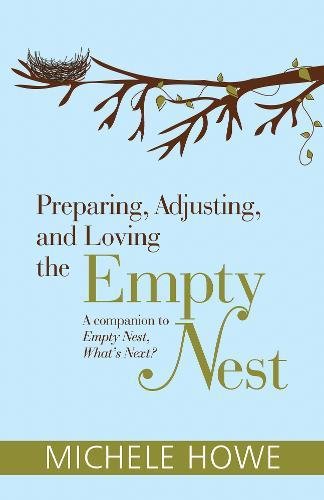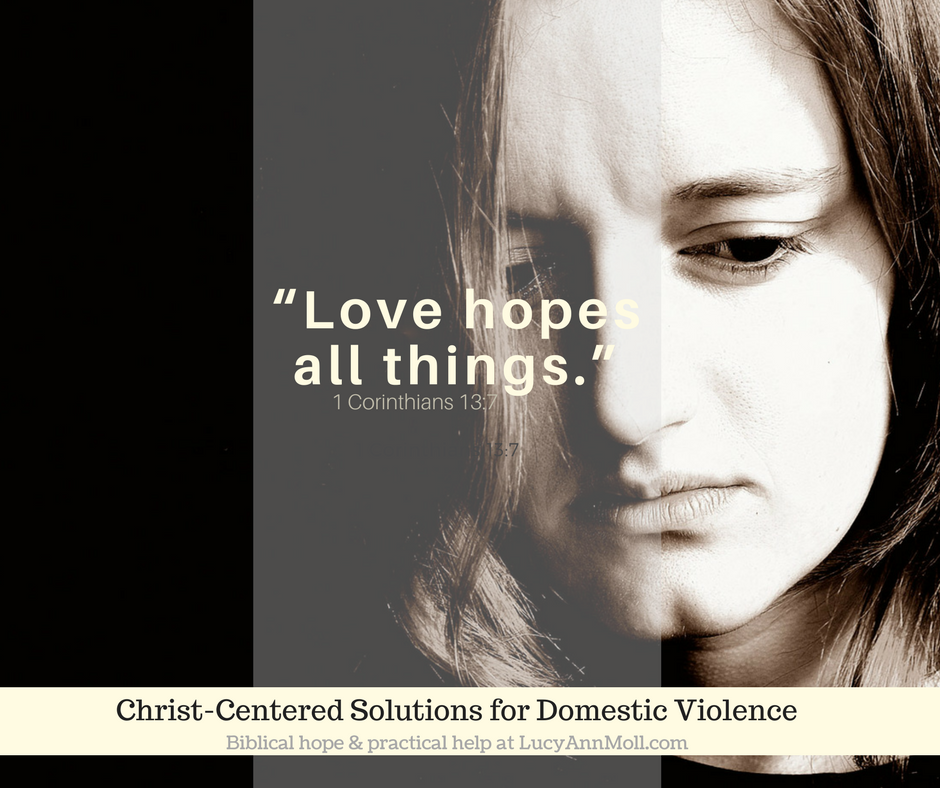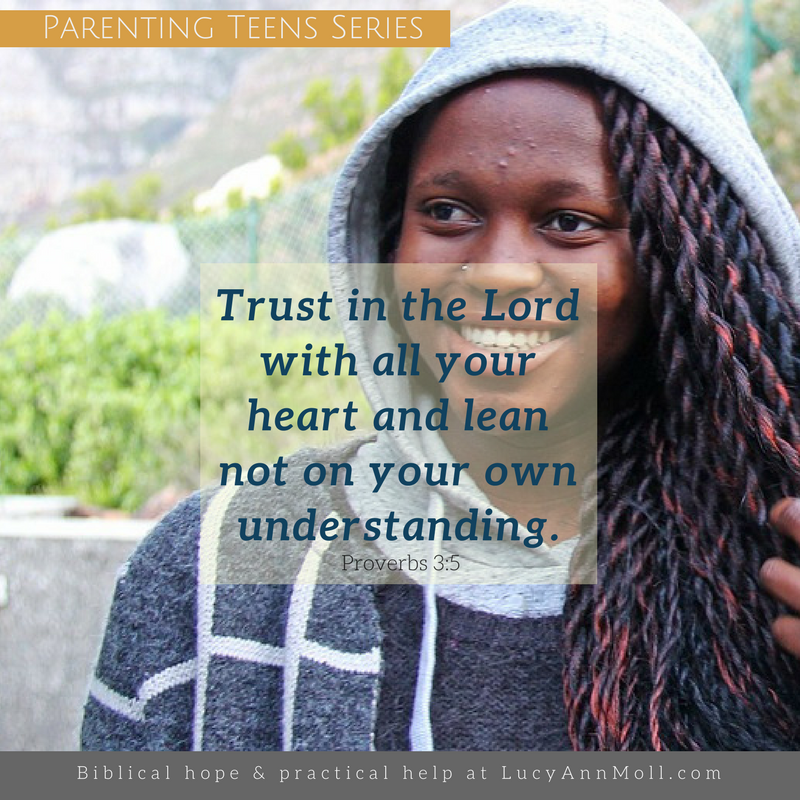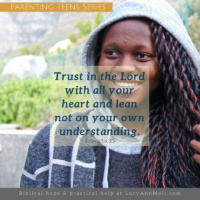by Lucy | Aug 1, 2017 | biblical counseling, book reviews, emotions, relationships
 Empty nest. Some women expectantly watch their adult children take flight and do life on their own. Other mothers fear their children leaving home. Still others must push them out the door. . .or the millennials may stay, like, forever.
Empty nest. Some women expectantly watch their adult children take flight and do life on their own. Other mothers fear their children leaving home. Still others must push them out the door. . .or the millennials may stay, like, forever.
In this two-part series on the empty nest, you’ll discover. . .
- Best way to prepare your empty nest, whether your kids are just out of high school or farther down the road.
- How to adjust and love the empty nest, including finding romance as an empty nester, planning retirement, and welcoming grandbabies.
The Empty Nest Book!
 Author Michele Howe has written a book for any parent who finds herself in the midst of an empty nest. Preparing, Adjusting, and Loving the Empty Nest tackles the questions moms face, the emotions they encounter, and the changes soon to come. I strongly recommend it and wished I had it when I counseled a 50-something mom I’ll call Mary. See the book on Amazon here.
Author Michele Howe has written a book for any parent who finds herself in the midst of an empty nest. Preparing, Adjusting, and Loving the Empty Nest tackles the questions moms face, the emotions they encounter, and the changes soon to come. I strongly recommend it and wished I had it when I counseled a 50-something mom I’ll call Mary. See the book on Amazon here.
Mary, whom I counseled by Skype, lived in western United States with her husband and adult son. The son was nearing age 30, had a decent paying job in sales, and hunkered down at home. And he promised to look for an apartment. . .soon. But his empty promise “was just a way to get me off his back,” Mary admitted. “How can I encourage him to face the world, and at the same time, prepare for an empty nest?”
In a friendly, interactive style, Michele shares spiritual wisdom from the likes of seasoned biblical counselor Paul Tripp, take-away action steps, personal stories as well as prayers. Indeed, it is a cross between a devotional and a parenting how-to book.
While an older empty nest-er would find encouragement, hope, and practical ideas in the pages of Preparing, Adjusting, and Loving the Empty Nest, it best suits moms who are entering this season of life.
Preparing for the Empty Nest
GRADUATING HIGH SCHOOL: Opening with readying high schoolers to leave home (whether for college or work), Michele encourages parents and children to talk about making solid choices, expecting stress and excitement, and relying on Jesus Christ.
Take-away action thought:
BUDGETING: Teaching children — and reminding yourself — to handle money with care and prayer pays off as you enter the empty nest years.
PRAYER: Michele shares how she prays for her adult children.
Today is the only day that I have to get on my knees and express my concern for by beloved children. Tomorrow I may be gone. What better way to demonstrate a robust faith in the God who loves to hear from his children that to offer up heartfelt prayers for our kids?
She also suggests keeping a prayer journal, dating your prayers, and recording God’s answers.
LISTENING IN TOUGH TIMES: Learning to be a good listener strengthens your relationship, especially when your adult children come to you with one of life’s challenges. “We need to patiently listen to them speak,” Michele encourages. “Let’s not interrupt. Let’s not allow ourselves to sink into a fearul abyss because our children are teetering there.”
Instead of choosing fear, choose faith.
Click & Tweet!
- Remind your children that God has been faithful to your family through the years.
- Champion his character into your kids.
- Comfort your children over and over and over, as God leads.
TRUST THE LORD DAILY: In preparing an empty nest, you may feel undone. Does your wavering faith mean God has changed? No!
Click & Tweet!
Has he distanced himself from you? No, again. Does it mean you can prepare yourself for new times? Yes!
Take-away Action Thought:
When I feel myself pulling my children too close for their own good, I will ask for the strength to loosen my grip and send them off with a smile of my face and a song in my heart.
In part 2, let’s take a peek at adjusting and loving the empty nest. Feel free to send me your questions.
Until then. . .
Sharing Hope with Your Heart,

by Lucy | Jun 8, 2017 | relationships
 TRUE FRIENDS: Aren’t they hard to find? In this article by Kelly Needham, which appeared here and is used with permission, discover the 5 marks of true Christian friendship.–LAM
TRUE FRIENDS: Aren’t they hard to find? In this article by Kelly Needham, which appeared here and is used with permission, discover the 5 marks of true Christian friendship.–LAM

True friends are hard to find.
Click & Tweet!
They stick closer than family, and often know you better. They pray bigger things for you than you pray for yourself. They believe with you when your faith is weak. They make space for you when life falls apart, and they rejoice with you when all is well. Most importantly, true friends remind you in every encounter who and what is most important.
The essence of Christian friendship is companionship forged in the fire of two convictions: 1) Jesus alone can satisfy the soul and 2) his kingdom alone is worth living for.
Enemies in Disguise?
Jesus is our Bread of Life, our Living Water, our Pearl of Great Price, our Light, our Resurrection, our very Life. The greatest danger to our souls is that we might abandon abiding in him, following him, and finding our joy in him. Therefore, the best gift a friend can give is a commitment to fight for our joy in and communion with Christ.
Conversely, the worst distortion of friendship arises when a friend encourages us, consciously or unconsciously, to place our affections elsewhere. The apostle Peter unwittingly acts out this kind of distortion in Matthew 16. Jesus tells his disciples that he will die and rise again (Matthew 16:21). Peter rebukes Jesus with what was surely a well-intentioned comment from a loyal friend: “Far be it from you, Lord! This shall never happen to you” (Matthew 16:22).
It looks like the deepest, most genuine, most beautiful form of friendship, but Peter’s words put him between Jesus and his obedience to the Father. His ignorance made a friend into an enemy, at least for a moment. “Get behind me, Satan! You are a hindrance to me” (Matthew 16:23). What Peter thought was helpful, Jesus called a hindrance. What Peter assumed was godly friendship, Jesus called satanic opposition.
Click & Tweet!
Five Marks of Christian Friendship
So, how can we avoid Peter’s mistake in our friendships? How can we be a friend who preserves and strengthens the faith of others? Here are five distinct ways that true Christian friendships bolster our love for Christ through our love for one another.
1. True friends heighten our joy in God.
Companionship always deepens joy. My favorite movie is good when watched alone, but it’s better with a friend. Somehow a great meal is more satisfying when shared. We naturally drag our friends into what we enjoy: “You have to see this movie!” “You have to come to this restaurant with me!”
But of all the joys of life, God is the greatest! We were made for him — to enjoy him and center our hearts and lives on him. And like any other joy, our joy in God will be fullest when we share it with other people. Christian friends help us enjoy God by enjoying him with us.
It’s tempting to flip and distort this formula by using God as a means to enjoy people more. If we only go to him to ask for spouses, friends, or kids to enjoy, it reveals we see God as the means to someone else. We should be doing the opposite: looking for more of him in other people. Ironically, we will enjoy our friends more, the more our friendships become a means of enjoying God.
Click & Tweet!
2. True friends expose sin in us that keeps us from God.
Faithful are the wounds of a friend; profuse are the kisses of an enemy. (Proverbs 27:6)
Sin deceives us. It darkens our understanding and makes us fools. So much so that we may be walking in sin and convinced that we are obeying God (think of the Pharisees). This is why we desperately need friends.
We need friends to lovingly show us our sin. We need friends to help us see our blind spots. We need friends to speak with brutal honesty (Matthew 18:15) and tender compassion (Galatians 6:1), telling us the truth about ourselves even when we don’t want to hear it (Ephesians 4:15).
This is a vital function of community that few people want. We’d much rather have friends who always tell us what we want to hear, who show us the false grace of excusing sin and give us false hope that we can grow closer to God without repentance. But because sin is a poison to our souls and a thief of our joy in God, we cannot afford to forsake this kind of friendship.
3. True friends encourage us to obey God.
While it is true we need friends to help us see any disobedience, we also need them to spur us on to obedience. Often, obedience to God takes more courage than we can muster alone. Without the faithful cheerleading of Christian friends, we easily shrink back into stagnant apathy, not wanting to willfully disobey, but also too afraid to step out in faith.
The encouragement we are told to give isn’t flattery, or superficial inspiration. En-courage-ment is giving courage and strength to others for the intimidating task before them. We cast a bigger vision for why their obedience matters for God’s kingdom. We affirm that their obedience glorifies God and counts in eternity.
Whatever form it takes, encouragement motivates others to continue running the specific race God has marked out for them.
4. True friends bring us to God in our weakness.
Behold, some men were bringing on a bed a man who was paralyzed, and they were seeking to bring him in and lay him before Jesus, but finding no way to bring him in, because of the crowd, they went up on the roof and let him down with his bed through the tiles into the midst before Jesus. (Luke 5:18–19)
Walking through life in a God-belittling world, with our sin-ridden flesh, against a hell-bent enemy, is too hard to be attempted alone. Alone, we easily believe the lies of Satan. Alone, we buckle under the weight of our sin. Alone, we grow discouraged and weary. Like the paralytic, we need the help of other believers to carry us to God.
So, how can we bring others to God? We listen to a sister confess a hidden sin and wash her with the truth that Christ has cleansed her and made her whole. We can meet the practical needs of those enduring intense suffering in Jesus’s name. Or we can simply bring our friends to God in prayer, asking him to do greater things in their lives than we can do for them.
5. True friends love us for the glory of God.
The world’s idea of intimacy in friendship is making much of one another: “I can’t live without you!” Compliments and pledges of devotion quickly give a brief and false adrenaline rush of importance and significance. We certainly need to encourage and affirm one another, but Christian friends should be far more focused on God’s weight and significance — not their own or their friend’s.
Like everything else, the end goal of our friendships should be God and his glory.
Click & Tweet!
Since our hearts are prone to wander away and worship other things, we need these constant reminders of his glory and his worth in our friendships.
Sharing Hope with Your Heart,


by Lucy | Jun 6, 2017 | biblical counseling, emotions, relationships
OPIOID ADDICTION: The abuse of pain pills and heroin is so common that you probably know a professed Christian who’s addicted to opioids. In this article, listen to the strange case of Cecilia, once a finance executive, now an unemployed mom who gets high daily.
Do you know a Cecilia? How can you counsel her? This article also appeared here at Biblical Counseling Coalition, where Lucy also writes regularly.
 When Cecilia* scheduled a counseling appointment, she told our center’s secretary that she popped pain pills and needed help for addiction. This case sounded challenging, but with God I knew it would be a success, for “He who began a good work in you will carry it on to completion until the day of Christ Jesus” (Phil. 1:6).
When Cecilia* scheduled a counseling appointment, she told our center’s secretary that she popped pain pills and needed help for addiction. This case sounded challenging, but with God I knew it would be a success, for “He who began a good work in you will carry it on to completion until the day of Christ Jesus” (Phil. 1:6).
Becoming more like Christ is a primary goal of biblical counseling, isn’t it? But what if a counselee doesn’t grow in Christ-likeness? Then is counseling a failure? We will explore the answers to these questions through the case of Cecilia.
A semi-regular church attender, Cecilia claimed true belief in Jesus Christ on the Personal Data Inventory she completed. But, months after her initial counseling visit, and as she persisted in her opioid addiction and other sins, especially lying, I doubted her conversion. So did her husband and her pastor.
As you hear the story of Cecilia, ask yourself how you would counsel her. Chances are, as opioid addiction grows exponentially in the United States and worldwide, at some point you will counsel a “Cecilia.”
Click & Tweet!
Gathering Data on Cecilia and Drugs
Cecilia is married and a 40-year-old mother of an 8-year-old girl. Early in her career in finance she received good pay and earned promotions, spending money on nice cars, fun vacations, and classy clothes. But then she lost her job. Soon after, she reported to her doctor ongoing physical pain, and he prescribed one opioid and then a second.
Her pain persisted, her sleeping worsened, and she sometimes raged against her husband, tossing cuss words like grenades and even hitting him. She sought help from a psychiatrist who gave her the diagnoses of Bipolar 2, depression, and anxiety. (Cecilia did not initially list these diagnoses and all of her medicines on her Personal Data Inventory. Later I confirmed the information with her husband and her pastor.)
After three appointments with me, Cecilia began skipping sessions. Some excuses – an ill child – sounded reasonable; others didn’t. This stop-start pattern of our counseling interfered with progress and gave her multiple times to retell her story, looking for sympathy and avoiding discussing the changes she needed to make. Would it have been best for me to get a commitment early in counseling and make skipped sessions a reason for me to end counseling her?
As data gathering continued, I learned that her medicine regime included sleeping pills to fall asleep, an amphetamine to wake up, an antidepressant, a tranquilizer, and mood stabilizers. This medicine cocktail concerned her husband – and me as well. He said as long as she followed the doctor’s instructions perfectly, Cecilia seemed to do better. However, she often failed to follow his instructions. In fact, she liked the feeling of “checking out” when she took double doses of an opioid. I filled out a consent form that Cecilia signed so that I might speak with the psychiatrist for additional data gathering.
The Husband Shares Concerns
Cecilia had said she believes in God, prays, reads the Bible, and is saved. However, on her Personal Data Inventory, she left the section “Why should I let you into my heaven?” blank. When I asked her about it, she gave what sounded like a sincere answer. But should I have asked more compelling questions to detect lying?
While her pastor was very concerned about Cecilia’s salvation, her husband said his concern was not her salvation as much as it was her abuse of pills. He feared for her well-being and their daughter’s. For example, he said Cecilia often woke up in the middle of the night and smoked a cigarette in the garage, falling asleep while it was lit.
As her husband helped fill in the blanks, I realized the extent of her lies to me. When I lovingly confronted her, she became angry and said she didn’t want her husband to join her in counseling any longer. Her husband’s presence in counseling helped her keep her appointments and tell the truth, though they often argued in the counseling office. A great disagreement was over their daughter, who Cecilia said was very ill from allergies; her husband said their child wasn’t sick. A pediatrician agreed with the husband.
Identifying the Problem
Among Cecilia’s problems are extreme selfishness, idolatry (specifically, looking to drugs to meet her “needs”), rebellion, and lying. I helped her understand her heart idolatry. For example, I used a diagram of the heart, marking the middle with “desires, motivations, beliefs” and made arrows to show that thoughts, emotions, and actions flow from the heart. Among the Scriptures we looked up together were Proverbs 4:23, Luke 6:45, Matthew 15:18-19, Jeremiah 17:9, and Mark 7:18-23.
Cecilia appeared interested in identifying and ridding her heart idols. However, she rarely did the assigned homework. Instead, she had excuses and blamed her husband for her problems. We discussed godly and worldly repentance. My hope was for her to see her need for Christ, but the confusion and lies continued. I warned Cecilia about these and other poor decisions she was making.
Counseling Comes to a Halt
At some point soon after the wording, she called her psychiatrist, who recommended that she stop counseling with me. The pastor spoke with the psychiatrist and confirmed that he wanted her to see a counselor at his own practice. And so biblical counseling with me stopped.
Reviewing her case, I concluded it was both a failure in one sense and a success in another.
Counseling was a failure in that Cecilia didn’t move toward Christ-likeness. But how could she? While she spoke “Christian-ese,” she was an unbeliever and thus did not have the indwelling Holy Spirit.
Counseling was a success in that while Cecilia remained in sin, her husband not only made a plan to keep their daughter safe (a family member moved in with them) but also now studies the Bible regularly with their pastor and other Christian men at church. And he prays: for their marriage, their little girl, and most importantly for Cecilia’s salvation. They pray that the psychiatrist or another medical doctor intervenes and, with God’s help, she is freed from her opioid addiction.
Questions for Reflection
How will you counsel a “Cecilia”? What have been your experiences with counseling opioid addicts?
Click & Tweet!
* Names and identifying details have been changed.
Sharing Hope with Your Heart,

by Lucy | May 9, 2017 | biblical counseling, biblical counseling, relationships
 Abused? Were you abused, phyically or sexually, in your marriage? In part 2 of this multi-part series on domestic violence, guest writer Jim Newheiser carefully looks at common assertions and takes a balanced view. This post appeared first here at the Biblical Counseling Coalition website and is reprinted with permission.
Abused? Were you abused, phyically or sexually, in your marriage? In part 2 of this multi-part series on domestic violence, guest writer Jim Newheiser carefully looks at common assertions and takes a balanced view. This post appeared first here at the Biblical Counseling Coalition website and is reprinted with permission.
Read Part 1 here: When to believe the victim, when to believe the abuser

I am thankful to God that many necessary and important books and articles are being written to increase awareness of physical and sexual abuse. Abuse affect both the society at large and the Christian community in particular. Spiritual leaders have been rightly admonished for their failure to protect at-risk women and children.
Battered wives have been wrongly told that if they were just more loving and submissive, their husbands would change and the abuse would stop. They are then wrongly sent back to take further verbal and physical beatings. Many church leaders need to repent of their failure to “rescue the weak and needy; [and] deliver them out of the hand of the wicked” (Psalm 82:4 ).
).
While I affirm the importance of understanding the dark nature of abuse and protecting the victims of abuse, I am concerned that some, in their zeal to correct the failure of the past, have swung too far the other way. This can lead to false accusations and unnecessary family breakups.
I would like to give a few examples of what I believe to be common overstatements, and for each one, I will describe the good intention behind the statements, the harm which can be caused because of imbalanced thinking, and a more balanced way of expressing the same concerns.
If You Feel Abused, Then You Were Abused?
ASSERTION: If you feel abused, then you were abused.
- The valid concern: This statement is often made to express the reality that abuse may have taken place even if the abuser does not recognize or acknowledge his behavior (yelling, pushing, bullying, coercion, threats, and intimidation) as wrong.
- The harm that can be caused: On the other hand, the Bible teaches that it is possible to wrongly interpret the words, actions, and motives of others (1 Corinthians 2:11).
For who knows a person’s thoughts except their own spirit within them? In the same way no one knows the thoughts of God except the Spirit of God. 1 Corinthians 2:11
For example, Eli falsely accused Hannah of drunkenness because her lips were moving as she prayed (1 Samuel 2:12ff). We cannot judge one person merely by the subjective feelings of another. For example, a man may be in a rush and accidentally bump into his wife (with whom he had had a recent conflict) as he turns a corner. She may accuse him of doing it deliberately to harm her when that was never his motive.
Words also can be misunderstood. What is taken by one person as angry and abusive might have never been intended as such. Nor might it have been interpreted this way by an objective third party.
Scripture reminds us: “Love hopes all things” (1 Cor. 13:7); in other words, love seeks to assume the best.
3. It would be better to say: A person who feels abused should be helped to objectively evaluate what has happened and to get assistance if genuine abuse has taken place. Part of this objective evaluation involves considering the ongoing pattern and cumulative effect of the accused person’s behavior, as well as the immediate accusation at hand. Proper evaluation over time keeps us from wrongly escalating the consequences for one individual incident while also not dismissing the whole situation because one incident wasn’t deemed as abusive.
Sometimes a Victim Has a Sin Issue Too
ASSERTION: It is never the victim’s fault.
- The valid concern: Many abusers claim that their victims are to blame because the victim provoked him or failed to be as good a wife or child as they should be. Many victims suffer from false guilt. There is no valid excuse for physical or sexual abuse.
If it is possible, as far as it depends on you, live at peace with everyone. Romans 12:18
2. The harm that can be caused: Some victims have sin issues which also need to be addressed. I counseled in a case in which a wife would berate and insult her husband, saying “Come on Jesus man, hit me!” She admitted that she felt that she had won the argument when he finally struck her. Again, I emphasize there was no excuse for him hitting her. But she also needed to address her personal sinfulness.
There have been cases of sexual assault in which the woman got herself into an extremely compromising and dangerous situation (i.e., drunk, alone, and making out with a man with whom she is not married). Again, the man should have stopped when she said, “no”
Click & Tweet!
(also see Habakkuk 2:15). If he assaults her, he is guilty of a crime and should be punished. But she also needs to acknowledge before God her personal sin in the situation. Deuteronomy 22:23-24 addresses situations like this.
3. It would be better to say: Abuse is never justified, but victims may need to examine themselves to see if they have any sin for which they also need to seek God’s forgiveness.
(Friend, if someone has abused you, please seek help from a caring pastor, a spiritually wise woman at your church, or from a biblical counselor, who counsels the compassionate, effective Word to your hurting heart. Learn more about biblical counseling by Skype.–LAM)
Sharing Hope with Your Heart,

by Lucy | Apr 27, 2017 | biblical counseling, emotions, relationships
 TEENS: Parenting teens means trusting God and showing them you care.
Click & Tweet!
These tips from Leia Joseph — a crisis counselor, high school music teacher, and mother — appeared first here on The Biblical Counseling Coalition website and is used with permission. This is part three of a 3-part series on parenting teens.–LAM
TEENS: Parenting teens means trusting God and showing them you care.
Click & Tweet!
These tips from Leia Joseph — a crisis counselor, high school music teacher, and mother — appeared first here on The Biblical Counseling Coalition website and is used with permission. This is part three of a 3-part series on parenting teens.–LAM

I have had the privilege of spending the last 13 years working as a music teacher and crisis counselor for teens. The following six tips represent a handful of lessons I have learned along the way. If you are the parent of a teenager or pre-teen, I pray that you find this helpful.
Here are part 1 and part 2 in this parenting teens series.
5. Drop Everything to Show You Care
But care about other things too.
There is nothing like the knowledge that someone will be there for you no matter what. The simple understanding that a parent will walk out of an important meeting at work or cancel a night out with friends because his or her child is in need insurmountably communicates love and provides security to that child.
However, your teen is growing more and more independent. Teens know when they are your whole world. They can tell if there is nothing else fueling excitement, creativity, and purpose in your life apart from them. This brings its own set of pressures and vices.
Practical Help
Explore the passions God has given you. Take care of your own well-being. Seek the Lord about whom you can serve and minister. Always be willing to put these things aside for your own child.
6. Trust God’s Plans
God’s plans ultimately outshine your dreams.
 I have only just begun the parenting journey and already know the gut-wrenching reality that my son’s pain is my pain tenfold. You love your children more than anything in the world. You would even give your life in order for them to live if necessary.
I have only just begun the parenting journey and already know the gut-wrenching reality that my son’s pain is my pain tenfold. You love your children more than anything in the world. You would even give your life in order for them to live if necessary.
Still, good parents don’t equal good kids. Despite all that you pour into your teens with love, prayer, and opportunity, they may still push it all away. Even still, persevere in loving, praying, and trusting that God loves your teens even more than you do.
As my pastor, Mark Dever, often says, “Where there is life, there is hope.”
They may graduate from high school and find themselves entrenched in sin, but their story isn’t over yet. Be faithful by loving and caring for them today. And trust that the Lord will ultimately write a better story for your child than you could ever imagine.
Sharing Hope with Your Heart,

 Empty nest. Some women expectantly watch their adult children take flight and do life on their own. Other mothers fear their children leaving home. Still others must push them out the door. . .or the millennials may stay, like, forever.
Empty nest. Some women expectantly watch their adult children take flight and do life on their own. Other mothers fear their children leaving home. Still others must push them out the door. . .or the millennials may stay, like, forever. Author Michele Howe has written a book for any parent who finds herself in the midst of an empty nest. Preparing, Adjusting, and Loving the Empty Nest tackles the questions moms face, the emotions they encounter, and the changes soon to come. I strongly recommend it and wished I had it when I counseled a 50-something mom I’ll call Mary. See the book on Amazon here.
Author Michele Howe has written a book for any parent who finds herself in the midst of an empty nest. Preparing, Adjusting, and Loving the Empty Nest tackles the questions moms face, the emotions they encounter, and the changes soon to come. I strongly recommend it and wished I had it when I counseled a 50-something mom I’ll call Mary. See the book on Amazon here.

 TRUE FRIENDS:
TRUE FRIENDS:




 TEENS:
TEENS: 
 I have only just begun the parenting journey and already know the gut-wrenching reality that my son’s pain is my pain tenfold. You love your children more than anything in the world. You would even give your life in order for them to live if necessary.
I have only just begun the parenting journey and already know the gut-wrenching reality that my son’s pain is my pain tenfold. You love your children more than anything in the world. You would even give your life in order for them to live if necessary.
